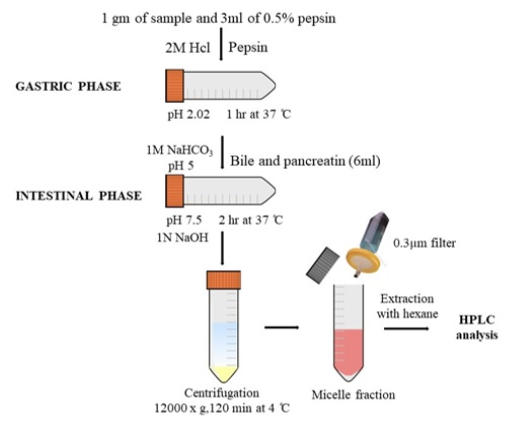β-carotene Bioavailability and retention in Biofortified Maize (Zea mays L.) after Processing and Preparation of Indian foods
Sandesh G. M., C. Saran Kumar, P. Bharathi, M. Dhasarathan, A. Karthikeyan, V. Meenakshi, K. Thangaraj, S. Vellaikumar, V. Baskaran, N. Senthil*
Research Article | Published: 11 January, 2019
First Page: 68
Last Page: 74
Views: 5118
Keywords: β-carotene, maize, β carotene retention, invitro digestion, Bioavailability
Abstract
β-carotene rich maize hybrids were developed to target vitamin A deficient populations in developing countries. However, processing the maize into food products may reduce its β-carotene content. Thus, understanding β-carotene retention is important for assessing efficacy of biofortified foods. The objectives of this study were to determine the concentration of β-carotene in biofortified maize hybrids as well as to evaluate their retention during processing of popular maize foods consumed in India. The β-carotene content in maize hybrids and their food products were estimated through high-performance liquid chromatography (HPLC). Results showed that β-carotene content ranged from 0.61-6.35µg/g in raw maize inbreds, after invitro digestion the bioavailabity of β-carotene ranged 0.33-4.03 µg/g. In food products the retention of β-carotene was 24.14-58.78 % as the β-carotene degradation will be influenced by the processing methods and external environmental conditions like light, temperature, pH, oxidation and storage. In conclusion, the degradation of β-carotene occurs during digestion storage and cooking thus for development of biofortified maize hybrids the bioavailability and their retention plays a significant role. This study demonstrates, there is a need to optimize and recommend maize processing methods in which there will be maximum retention of provitamin A, β-carotene to ensure optimum delivery of β-carotene to consumer.

References
- Bouis H, Low J, McEwan M and Tanumihardjo S (2014) Presented in part at the Second International Conference on Nutrition (ICN2). Rome, Italy. Pp 19-21.
- Cruz R, Vieira M and Silva C (2009) Impact of thermal blanching and thermosonication treatments on watercress (Nasturtium officinale) quality: process optimisation and microstructure Food and Bioprocess Technology 4(7) : 1197-1204
- Garrett DA, Failla ML and Sarama RJ (1999) Development of an in vitro digestion method to assess carotenoid bioavailability from meals. J Agric Food Chem 47: 4301-4309.
- Granado F, Olmedilla B, Blanco I and Rojas-Hidalgo E (1992) Carotenoid composition in raw and cooked Spanish vegetables. J Agric Food Chem 40: 2135-2140.
- Gregory JF (1996) Vitamins. In: Fennema Food chemistry. (3rd edtn), Marcel Dekker, New York. Pp 545–546
- Grune T, Lietz G, Palou A, Ross AC, Stahl W, Tang G and Biesalski HK (2010) β-Carotene Is an Important Vitamin A Source for Humans. The J Nutr 140: 2268-2285.
- Haskell MJ (2012) The challenge to reach nutritional adequacy for vitamin A: β-carotene bioavailability and conversion evidence in humans. The Amer J Clinical Nutr 96: 1193-1203.
- Khachik F, Beecher GR, Goli MB and Lusby WR (1992a) Separation and quantification of carotenoids in foods Methods Enzymol 213: 347–359
- Khachik F, Goli MB, Beecher GR, Holden J, Lusby WR, Tenorio MD and Barrera MR (1992b) Effect of food preparation on qualitative and quantitative distribution of major carotenoid constituents of tomatoes and several green vegetables. J Agric Food Chem 40: 390-398.
- Kruger JE, Matsou RB and Dick JW (1994) Pasta and noodles technology. American Association of Cereal Chemists, Minnesota.
- Lakshminarayana R, Raju M, Krishnakantha TP and Baskaran V (2005) Determination of major carotenoids in a few Indian leafy vegetables by high-performance liquid chromatography. J Agric Food Chem 53(8): 2838-2842.
- Lakshminarayana R, Raju M, Prakash MK and Baskaran V (2009) Phospholipid, oleic acid micelles and dietary olive oil influence the lutein absorption and activity of antioxidant enzymes in rats. Lipids 44(9): 799-806.
- Li S, Tayie FA, Young MF, Rocheford T and White WS (2007) Retention of provitamin A carotenoids in high β-carotene maize (Zea mays) during traditional African household processing. J Agric Food Chem 55(26): 10744-10750.
- Lozano-Alejo N, Carrillo GV, Pixley K and Palacios-Rojas N (2007) Physical properties and carotenoid content of maize kernels and its nixtamalized snacks. Inno Food Sci Emerg Technol 8(3): 385-389.
- Maiani G, Periago Castón MJ, Catasta G, Toti E, Cambrodón IG, Bysted A and Valoti M (2009) Carotenoids: actual knowledge on food sources, intakes, stability and bioavailability and their protective role in humans. 53(2): 194-218.
- Murphy EW, Criner PE and Gray BC (1975) Comparisons of methods for calculating retentions of nutrients in cooked foods. J Agric Food Chem 23(6): 1153-1157.
- Muzhingi, Yeum, Qin and Tang (2008) Determination of carotenoids in yellow maize, the effects of saponification and food preparations. Internatl J Vit Nutr Res 78(3): 112-120.
- Muzhingi T, Yeum KJ, Bermudez O, Tang GW and Hlanganiso Siwela A (2016) Peanut butter increase the bioavailability and bioconversion of Kale β-carotene to vitamin A. Asia Pacific J Clinical Nutr.
- Nuss ET and Tanumihardjo SA (2010) Maize: a paramount staple crop in the context of global nutrition. Compr Rev Food Sci Food Safety 9(4): 417-436.
- Ortiz-Monasterio JI, Palacios-Rojas N, Meng E, Pixley K, Trethowan R and Pena R (2007) Enhancing the mineral and vitamin content of wheat and maize through plant breeding. J Cereal Sci 46(3): 293-307.
- Rodriguez-Amaya DB (1997) Carotenoids and food preparation: the retention of provitamin A carotenoids in prepared, processed and stored foods: John Snow Incorporated/OMNI Project Arlington, VA.
- Sanjuan N, Benedito J, Clemente G and Mulet A (2000) The influence of blanching pretreatments on the quality of dehydrated broccoli stems/Influencia del tipo de escaldado en la calidad de tallos de bróculi deshidratados. Food Sci Technol Internatl 6(3): 227-234.
- Weber D and Grune T (2012) The contribution of β carotene to vitamin A supply of humans. Mol Nutr Food Res 56(2): 251-258.
Author Information
Department of Plant Breeding & Genetics, 2 Department of Biotechnology, Agricultural College and Research Institute, TamilNadu Agricultural University, Madurai, Tamil Nadu, India